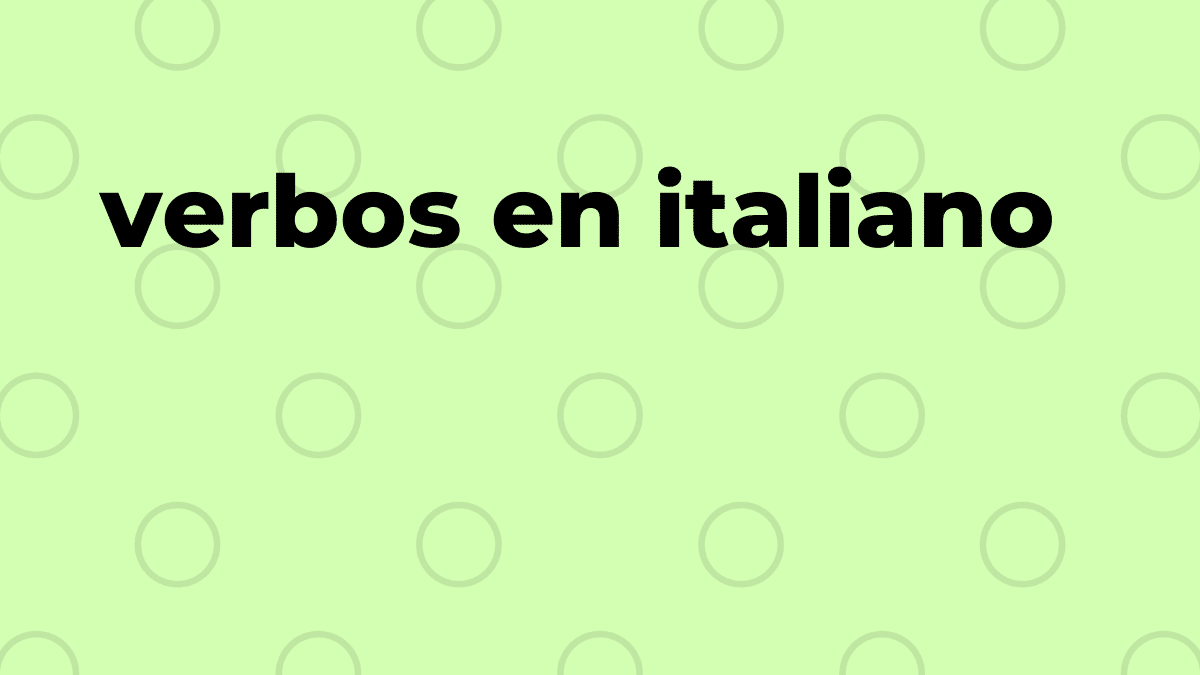
El Italian taste It is a Romance language, spoken mainly in Italy and in some bordering countries. Being a language descended from Latin, it has a significant degree of similarity with other Romance languages, such as Spanish, French, and Portuguese. The study of essential verbs in Italian, as well as its conjugations, can be very useful to communicate effectively and understand the basic structures of the language. In this article, we will explore the fundamental verbs in Italian, with special attention to their conjugations and uses.
Regular verbs in Italian
In Italian, verbs are divided into three main groups based on their infinitive ending: -are, -ere e -I will go. This classification is relevant because each group has its own conjugation rules. We will study some regular verbs and their conjugations in these three groups.
First, let's explore verbs that end in -are. A typical example is the verb «speak" (talk). The conjugation in the present of the indicative is the following:
- I speak (I speak)
- Tu parli (you speak)
- Lui/Lei talks (he/she talks)
- Noi parliamo (we speak)
- Voi parlate (you/you speak)
- Talking parrot (they talk)
Regular verbs with the ending -ere and -ire
Next, let's look at the regular verbs that end in -ere, What "to write" (write). The conjugation in the present of the indicative is the following:
- I write (I write)
- Tu scrivi (you write)
- Lui/Lei scrive (he/she writes)
- Noi scriviamo (we write)
- Voi scrivete (you/you write)
- Parrot scrivono (they write)
Finally, let's analyze the verbs that end in -I will go as "sleep" (sleep). The present conjugation of the indicative is presented as follows:
- Io sleep (I sleep) [sleep-o]
- Tu dormi (you sleep) [dorm-i]
- Lui/Lei dorme (he/she sleeps) [dorm-e]
- Noi dormiamo (we/we sleep) [dórm-i-amo]
- Voi dormite (you/you sleep) [dórm-i-te]
- Dormono parrot (they sleep) [dorm-o-no]
Auxiliary verbs: essere and avere
Italian has two main auxiliary verbs: be (to be, to be) and have (have to have). These verbs are essential to build compound and passive forms in the language.
The conjugation in the present of the indicative of be is
- Io sono (I am/am)
- Tu sei (you are/are)
- Lui/Lei è (he/she is/is)
- Noi siamo (we/we are/are)
- Voi seven (you/you are/are)
- Parrot sono (they are)
On the other hand, the present conjugation of the indicative of have is
- Io ho (I have)
- You have (you have)
- Lui/Lei ha (he/she has)
- Noi abbiamo (we/we have)
- Voi avete (you/you have)
- Parrot hanno (they have)
Modal verbs: dovere, potere, volere
Modal verbs in Italian are similar to modal verbs in English and other Romance languages. These verbs, duty (have to), power (power and want (to want), are used to express obligation, possibility and desire, respectively.
As an example, we present the conjugation in the present of the indicative of power:
- I can (I can)
- You can (you can)
- Lui/Lei può (he/she can)
- Noi possiamo (we/we can)
- Voi potete (you/you can)
- Parrot possono (they can)
The present progressive in Italian
The present progressive in Italian is used to express ongoing actions, and is built using the verb stare (to be) together with the gerund of the main verb. The verb stare is conjugated as follows:
- Io sto (I am)
- You are (you are)
- Lui/Lei sta (he/she is)
- Noi stiamo (we/we are)
- Voi state (you/you are)
- Parrot stanno (they are)
To use the present progressive, the verb must be conjugated stare in the present of the indicative and add the gerund of the main verb, which is formed by adding the endings -and (for verbs in -are), -endo (for verbs in -ere) or -endo (for verbs in -ire) to the stem of the verb. For example:
Sto mangiando (I'm eating)
Stai scrivendo (You are writing)
Stanno dormendo (They are sleeping)
Mastering the conjugation of the essential verbs in Italian is of great importance for effective communication and a solid understanding of the language. With this article, you can take your first steps towards mastering Italian verb conjugations and increase your chances of learning and communication.



